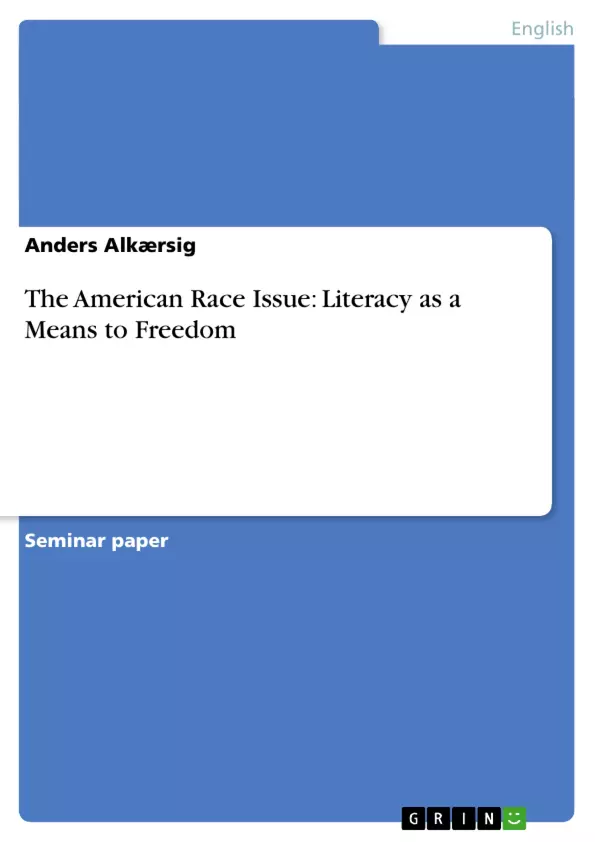The subject of ‘race throughout American history’ has evolved around has evolved around and run up against innumerable variables. One could choose, for example, to investigate the race issue’s relationship to labor market developments or any other equally important topic. However, due to the nature of the course, American History and Literature, of which this paper marks the ending, it is a natural consequence that this paper seeks to enquire into the race issue from a literary perspective. Again, hundreds of possible approaches present themselves to describe how the race issue has permeated literary history from the adoption of The Declaration of Independence in 1776 until now. This paper will approach literature’s role in the race issue from two primary perspectives, namely that of Frederick Douglass’ slave narrative in his Narrative of the Life of Frederick Douglass, an American Slave, and from that of Herman Melville’s novella Benito Cereno. Rather than an actual textual analysis of the two authors’ works, this paper will use them as tools to provide a glimpse of the nature of the race issue and to show how, in Frederick Douglass’ case for instance, literacy does not equal freedom. The paper will attempt to investigate two separate perspectives of the race issue, namely, to present the living conditions of slaves as well as of liberated slaves in the 19th century through the works of, primarily, Frederick Douglass, but also Harriet Jacobs and to explore the racist mind of the white man through Herman Melville’s Benito Cereno.
Inhaltsverzeichnis (Table of Contents)
- The American Race Issue: Literacy as a Means to Freedom
- Frederick Douglass' Slave Narrative
- Authorship and Credibility
- Literacy and Freedom
- Reliability of Accounts
- Harriet Jacobs' Slave Narrative
- The Slave's Narrative by Charles T. Davis and Henry Louis Gates Jr.
- Herman Melville's Benito Cereno
Zielsetzung und Themenschwerpunkte (Objectives and Key Themes)
This paper examines the role of literacy in the American race issue, focusing on the slave narratives of Frederick Douglass and Harriet Jacobs, as well as Herman Melville's novella Benito Cereno. It explores how literacy functioned as a tool for abolitionists, a symbol of freedom for former slaves, and a source of controversy regarding the reliability of slave narratives. The paper also investigates the persistence of racism in the North, even after the abolition of slavery.
- The role of literacy in the American race issue
- The evolution of the slave narrative from a strictly autobiographical work to a literary genre
- The challenges faced by former slaves in achieving true freedom, despite their literacy and escape from slavery
- The pervasiveness of racism in the North, even after the abolition of slavery
- The potential for racist interpretations in literary works like Herman Melville's Benito Cereno
Zusammenfassung der Kapitel (Chapter Summaries)
The paper begins by outlining the historical context of the American race issue, emphasizing the role of literacy in the fight for freedom. It then delves into Frederick Douglass' slave narrative, analyzing his authorship, his journey from slave to free man, and the controversies surrounding the reliability of his accounts. The paper also examines Harriet Jacobs' narrative and its portrayal of the challenges faced by former slaves in the North.
The paper concludes with an examination of Herman Melville's Benito Cereno, highlighting its significance as a literary work that addresses the complexities of slavery and racism in America. The paper explores the potential for racist interpretations of the novel and its impact on contemporary discussions of race.
Schlüsselwörter (Keywords)
The main keywords and focus topics of the text are: American race issue, literacy, slave narrative, Frederick Douglass, Harriet Jacobs, Herman Melville, Benito Cereno, abolitionism, racism, freedom, identity, reliability of accounts, antebellum era, literary analysis.
Frequently Asked Questions
What is the central theme of "The American Race Issue"?
The paper examines the role of literacy in the American race issue, specifically exploring whether literacy equated to freedom for enslaved people in the 19th century.
Which literary works are analyzed in this paper?
The analysis focuses on Frederick Douglass's "Narrative of the Life of Frederick Douglass", Harriet Jacobs's narratives, and Herman Melville's "Benito Cereno".
Does literacy guarantee freedom according to Frederick Douglass's account?
The paper argues that in many cases, literacy did not automatically equal freedom, though it was a powerful tool for abolitionists and self-identity.
What does the paper say about racism in the Northern United States?
It investigates the pervasiveness of racism in the North even after the abolition of slavery, affecting the lives of liberated slaves.
How is Herman Melville's "Benito Cereno" used in the study?
Melville's novella is used to explore the "racist mind of the white man" and the potential for racist interpretations in literature during that era.
- Quote paper
- Anders Alkærsig (Author), 2011, The American Race Issue: Literacy as a Means to Freedom, Munich, GRIN Verlag, https://www.grin.com/document/206589



